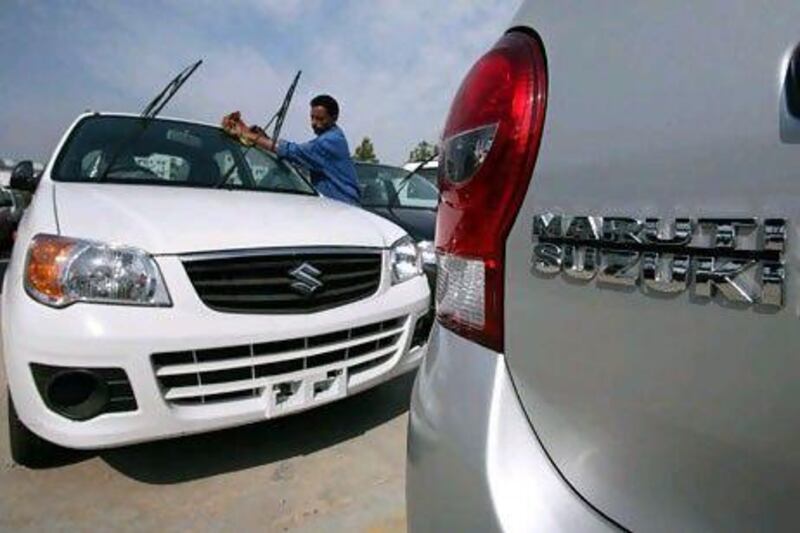After months of bumper sales, India's largest car maker Maruti Suzuki reported a sharp slowdown in business last month.
Sales plunged 25 per cent as the company grapples with the aftermath of a 13-day labour revolt in June over better terms and conditions, which resulted in a US$90 million (Dh330.5m) loss in output. Also denting sales are expensive car loans that are putting off consumers after 11 rounds of interest rate hikes by the central bank in the past 18 months.
The company sold 75,300 vehicles last month, compared with 100,000-plus units in the same month last year.
But "long-term bullishness" remains intact, said Mayank Pareek, the executive director for marketing at Maruti Suzuki. Buyers have tightened their purse strings, but the number of consumers visiting its showrooms has grown, he said.
In recent weeks, consumer spending in India has fallen with the growing cost of money, but consumer confidence - the "intention to buy" in the words of Mr Pareek - is still high, leading Indian companies to remain optimistic about sales over the long term.
India remained largely insulated from the shocks of the 2008 financial crisis that plagued many developed economies, largely due to robust private domestic consumption - the main catalyst driving economic growth.
With economic turmoil returning to haunt the US and much of Europe, many economic analysts are debating whether India can ride through the tumult with the same ease.
"Consumption has held up relatively well due to rising incomes as well as gold now being used as a productive asset," says Rohini Malkani, an economist with the investment bank Citi India. "However, higher interest rates could take a toll."
The Reserve Bank of India has raised key interest rates 11 times since March last year to combat stubbornly high inflation - described by Credit Suisse as "India's horror show".
Driven by rising prices of food, energy and manufactured goods, it inched up to 9.44 per cent in June, one of the highest rates across Asia.
In the April-to-June quarter, inflationary pressures compelled Indians to cut spending, said ACNielsen, a global marketing research company.
Indian consumers remained the most "optimistic" globally, but their confidence level shrank 5 points to 126 in the second quarter.
"Indians may be optimistic about their jobs and the state of their personal finances, but inflation is definitely making them think about their spending habits," said Justin Sargent, the managing director of consumer research at Nielsen India.
About half the Indians surveyed said they were forced to cut back spending on non-essentials such as new clothes, upgrading mobile phones and entertainment.
But overall, analysts note middle-class Indians are not so much cutting back on spending as much as recalibrating their spending habits to adjust to high prices of food and durables.
The vaunted middle-class culture of "conspicuous consumption" is rapidly changing to "conscious consumption".
Most middle-class Indian families - who typically spend between 30 per cent and 60 per cent of their monthly earnings on food alone - are increasingly shopping at large, organised retail stores such as Reliance Retail, led by the billionaire tycoon Mukesh Ambani, and the Aditya Birla Group-controlled More Retail.
The Boston Consulting Group (BCG) said such stores offer consumers at least 6 per cent more monthly savings on groceries compared with the millions of traditional corner shops that dominate the retail sector.
BCG said many shoppers also increasingly looked for buy-one-get-more-free offers, in an attempt to maximise what they get for their spending. But the concerns about economic slowdown are real, the government warns.
The Indian prime minister's economic advisory council recently revised its growth outlook for India this year to 8.2 per cent from its earlier projection of 9 per cent because of a "significant weakening" in investments.
"One by one, all the growth engines appear to be heading for a simultaneous slowdown," said Chetan Ahya, an economist with Morgan Stanley.





